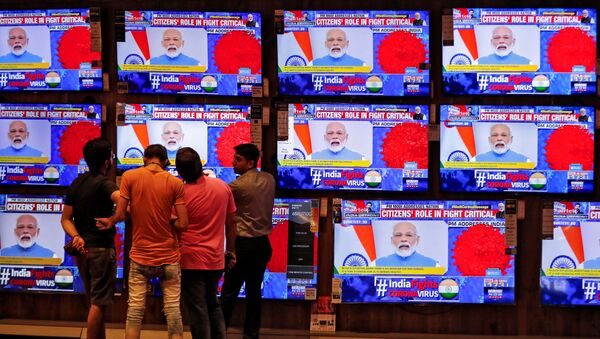Indian industry, which has suffered due to the coronavirus health crisis, is eagerly awaiting an economic package which looks imminent, Indian Finance Minister Nirmala Sitharaman has said.
While announcing a number of relaxations on tax payment deadlines, insolvency norms, and banking charges, the Indian Finance Minister on Tuesday indicated that the central government will also introduce an economic package “shortly” in order to safeguard Indian industry, which has been badly impacted by the Covid-19 pandemic.
While the economic task force set up by Prime Minister Narendra Modi is working on the package, one industrialist believes that COVID-19 will deal a “heavy blow”.
In an interview with Sputnik, Sunil Kanoria, Vice Chairman of Srei Infrastructure Finance Ltd, related to the infrastructure leasing and finance sector, and also formerly the president of Indian industry association Assocham, outlined an array of initiatives the government should announce in its economic package to make it relevant and effective.
Sputnik: Covid-19 has brought the economic activity globally to a standstill. How deep will be the impact of the lockdown in the already-slowing Indian economy?
Sunil Kanoria: There is going to be a massive impact. As it is, the Indian economy had been slowing down and facing challenge because of the multiple disruptions that happened in the last couple of years. Some industries were recovering out of that and reviving while some were still facing the challenges. But the pandemic comes as a heavy blow.
I think it will take India two to three years to evolve from the economic challenges that the pandemic brings. Small businesses will get much more badly impacted. Supporting only those businesses will not solve the problem. The entire eco system has to be supported as the small micro and small enterprises depend on the larger businesses. Relief recently provided by the finance minister is only focused on micro and small scale businesses.
The orientation is missing out and it has to be understood that a disruption as big as this does not differentiate between large and small businesses and equally impacts everyone. An all-encompassing approach has to be there.
Sputnik: India's Finance Minister has indicated that an economic package will be announced. How do you perceive the leftover areas that need to be addressed in the upcoming package?
Sunil Kanoria: Two key things are required. Since both businesses and individuals are supported by the financial sector, the government needs to take care of it. It has been badly bruised. We need to change the definition of non-performing asset (NPA). It has to be based on the potential asset value and the future cash flow of a particular business, and not on the current system of number of days of default.
Enhancing the current threshold of 90-day default to 180 days for categorisation as an NPA is not going to help. Globally, in the developed markets, NPA is not defined in this manner. In the US, China, Europe, Japan, and Russia, nobody defines NPA in terms of number of days. Basically, they assess the future wherewithal of the borrower to revive. Secondly, no one defines the restructuring of the loans. Even if restructuring is done, the account remains an NPA for one year. A lot of micromanagement that could have been left to the banks is being done by the regulators.
Sputnik: How will changing the NPA's definition help?
Sunil Kanoria: At this juncture, if the government changes the definition of NPA and restructuring, there will be a behavioural change. A bank, or a mutual fund, will rest assured that their account will not turn into an NPA, and they won’t have to provide more capital.

In that case, they will prefer to help the business stabilise and also recover the payment at a later stage, even if the business conditions are not favourable at present.
Sputnik: Apart from changing the definition of the NPAs, what more steps could help stimulate businesses amid the impact of COVID-19?
Sunil Kanoria: Various government agencies have a huge amount of dues to the private sector. For instance, the railways and the National Highway Authority of India have made very limited payments in the last three months. If the government clears all the dues, which, in fact are the rightful dues to the private sector, the entire banking sector will revive. About 30 to 40 percent of the industries in the economy today are dependent upon providing goods and services to the government, whether it is the central government, state government or the local bodies. But the government is the worst paymaster.
Sputnik: You are in the non-banking finance sector. Given the current situation, what kind of liquidity challenges are you facing?
Sunil Kanoria: Retail Non-Banking Financial Companies (NBFCs) have started to revive, as basically they book and they sell it to the banking sector. On the retail front, NBFCs have acted more as a sourcing agent. However, on the business side, NBFCs have been devoid of any funding and liquidity after the IL&FS crisis, which was a Lehman moment (the largest bankruptcy filing in the history of US) for India but people did not accept it. In the last one year, NBFCs dealing in wholesale funding or corporate financing have not been getting any funding at all. Liquidity has been virtually negligible. These challenges continue.
Sputnik: How can it be addressed? At a time when economic activity is at a standstill and NBFCs face liquidity issues, how will that critical last mile funding happen and how can the upcoming package address this?
Sunil Kanoria: For larger NBFCs, there are three options. Either gradually allow them to die, or align them with one or the other bank or merge them or convert them into banks. I foresee this happening. If it happens in a structured way, it will be better, if we don’t do it in a structured manner, it will happen as it is. There is no other mechanism.
Sputnik: In their fight against the COVID-19, central banks the world over have reduced benchmark rates. Do you expect India’s banking regulator Reserve Bank of India (RBI) to also follow suit?
Sunil Kanoria: We always believe in perceptions. I believe the RBI will reduce rates. However, the impact of it will be very marginal.





